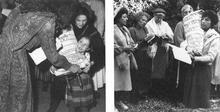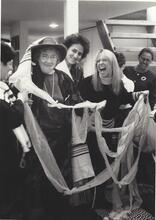Jacqueline Levine
Jacqueline Levine lent her voice to a stunning array of social justice causes, from civil rights to ending hunger to women’s leadership in the Jewish community. Levine joined the American Jewish Congress in 1954, protesting Joseph McCarthy. She then participated in various marches in the civil rights movement. In 1969 she became national president of the Council of Jewish Federations Women’s Division. In 1980, she became the first female national chair of the AJC’s governing council. From 1986 to 1987 Levine served as national chair of the Mobilization for Soviet Jewry, bringing 250,000 Jews to Washington to protest Soviet policies. She was a founding member of the Jewish Fund for Justice and MAZON: A Jewish Response to Hunger and served on the American Jewish Joint Distribution Committee.
Family and Education
Jacqueline Levine is an outstanding example of female activist leadership in American Jewish life. In over five decades of service to the Jewish community, she combined her powerfully deep liberal political beliefs and activities, which benefit the poor and disadvantaged, with her concern for the vast needs of specific Jewish communities.
Levine was born on January 28, 1926, into a highly educated Jewish family. In the 1920s, her mother, Theresa (Shulhin) Koldin, received her MA and studied toward her PhD at Columbia University. Her father, Harry Koldin, received his MA in history and worked as a dress manufacturer. They were socialist, antireligious, antifascist, deeply committed secular Jews living in Manhattan Beach, New York. Her younger sister is Nina Solarz, wife of former congressman Steven Solarz, who represented Brooklyn for many years.
After completing her studies at Abraham Lincoln High School, Jacqueline attended Bryn Mawr College, graduating in the war class of 1942. She received a BA studying psychology and political science. She later served on Bryn Mawr College’s board of trustees.
On January 5, 1949, Jacqueline married Howard Levine. They spent their first year of marriage in Puerto Rico, where Howard Levine was a professor of sociology at the university. During that year, Jacqueline Levine studied various disciplines. In 1950, they moved to New Jersey, where she worked in a department store and he began his business career. They had three children: Ellen (b. 1951), Stephen (b. 1953), and Ned (b. 1958).
Career
In 1954, Levine began her lifelong career of liberal volunteerism. Her first involvement was in 1954, with the American Jewish Congress in its fight to oppose Joseph McCarthy. She picketed Woolworth stores for their refusal to seat African Americans at their lunch counters. In 1963, she participated in the famous March on Washington. In 1965, she joined the celebrated march from Selma to Montgomery, which changed American history and fueled the burgeoning civil rights movement.
At the 1965 New York World’s Fair, Levine and eleven others peacefully distributed leaflets in front of the Jordanian pavilion, protesting its anti-Israel mural. Their arrest generated a great deal of publicity, and their vindication proved very significant. It affected Levine’s later political involvement in protesting restrictive Soviet Jewish emigration policies.
The Vietnam War deeply affected Levine and her family. From 1964 onward, they participated in many peace marches. Levine’s involvement with the American Jewish Congress intensified as she influenced its decision to oppose the Vietnam War. It was the first Jewish organization to take this stance. From 1971 to 1975, she served as the national president of the American Jewish Congress Women’s Division.
Levine also began assuming prominent leadership roles in her local Jewish community. In 1965, she became Women’s Division campaign chair for what is now known as Metro West Federation, New Jersey. For over thirty years she served on the executive committee of Metro West’s Board of Directors. As well, she represented Metro West on the Council of Jewish Federations (CJF) joint budgeting council.
In 1969, Levine became national president of the CJF’s Women’s Division. She is a talented and powerful speaker who cares deeply about poor people and Jewish communal needs. In what is perhaps her most famous speech, “The Changing Role of Women in the Jewish Community,” she raised this essential challenge to CJF leadership: Why were they ignoring women’s leadership? At that time, nationally, only three federations welcomed women as president. Levine’s words galvanized women to begin to demand Jewish leadership, both as lay and professional leaders.
In 1980, Levine became the first woman to serve as the national chair of the American Jewish Congress’s governing council. Her commitments to the Jewish domestic and international agenda led her to become involved with the National Jewish Community Relations Advisory Council (NJCRAC). Her desire to help Jews in the Soviet Union emigrate led her to become NJCRAC’s first woman chair for Soviet Jewry. In 1984, she took a harrowing trip to the Soviet Union where she was harassed and made to remain an extra day. In March 1985, she protested the plight of Soviet Jews on the steps of the Soviet embassy in Washington and was arrested. From 1986 to 1987, she served as national chair of the Mobilization for Soviet Jewry, which brought 250,000 American Jews to Washington to protest Soviet policies. Shortly after that, Soviet Jews began to pour out of the U.S.S.R. Levine has been honored many times by NJCRAC, most recently in February 1995 for her outstanding activities in the fields of civil rights, protection of the First Amendment, Soviet Jewry, and support for the State of Israel.
In 1985, Levine was a founding member of MAZON: A Jewish Response to Hunger, an organization that encourages the Jewish community to donate 3 percent of the costs of family celebrations such as bar and bat mitzvahs or weddings to fight hunger. In the 1980s, Levine also was a founding member of the Jewish Fund for Justice, a cause that remains close to her heart.
From 1989 to 1995, Levine served as chair of U.S. operations and vice chair of the national board of directors to the Hebrew Immigrant Aid Society. In 1996, she became chair of administration and personnel. Levine also served on the board of the American Jewish Joint Distribution Committee. She was one of the recipients of the “Woman Who Made A Difference Award,” presented to “American and Israeli feminists who have profoundly affected the lives of other women,” by the American Jewish Congress at a Lit. "assembly." The 120-member parliament of the State of Israel.Knesset ceremony in 2000.
Jacqueline Levine’s life is a distinguished record of service to the Jewish and general communities. She was an early feminist, advocating that Jewish women assume their rightful position as leaders in the Jewish community. She combined liberal political activism with devoted service to many areas within the American and world Jewish communities.
Levine, Jacqueline. Interview with author.






